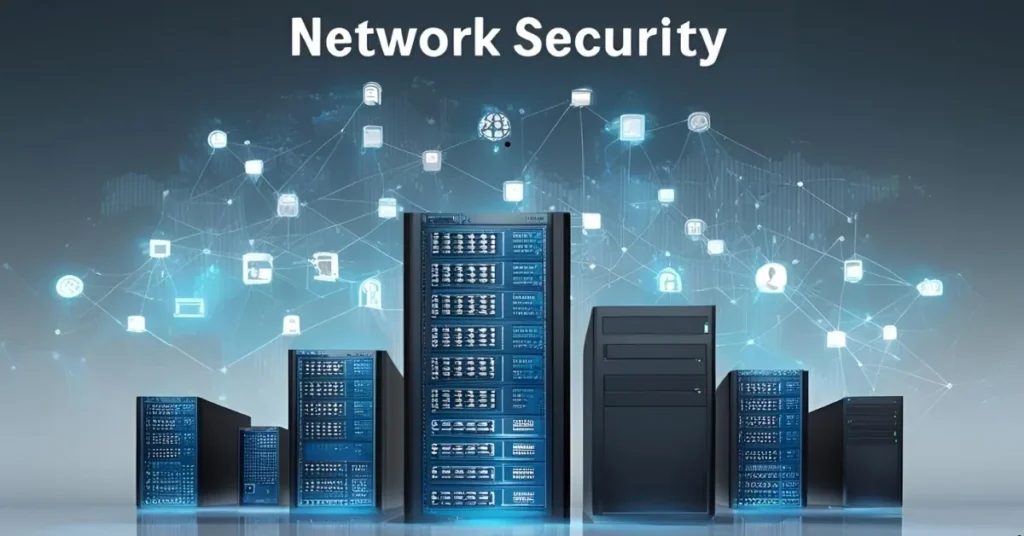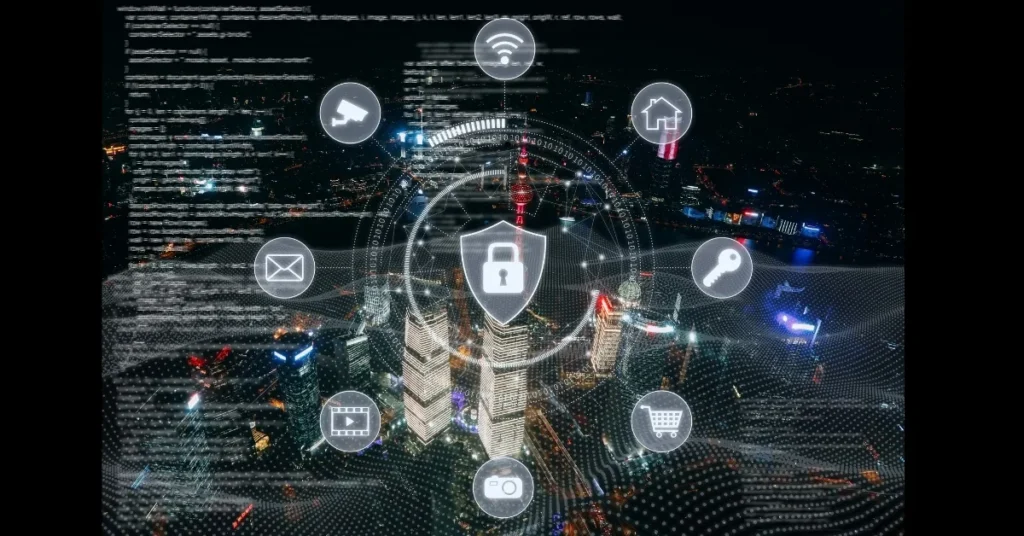Network Security safety is your virtual bodyguard.
It’s the tools, rules, and conduct that hold your community – Wi-Fi, laptops, servers – safe from hackers and malware.
Think of it as a bouncer who handiest shall we the good things through.
I as soon as thought a sturdy Wi-Fi password was enough for my home workplace. Nope. Hackers can crack that in minutes.
Network protection makes use of firewalls, encryption, VPNs, and more to secure your data.
Want the overall breakdown? Check out Kaspersky’s manual.

Why Network Security Matters
Hackers don’t care in case you’re a worldwide brand or a small shop. They need your facts.
A mate’s business was wrecked, losing $12,000 after a data breach because they overlooked community security.
This isn’t just for tech geeks – it’s for everybody who doesn’t need their bank account emptied or identification stolen.
In 2025, cyber threats will be smarter and quicker. Let’s outsmart them.
Top Network Security threats 2025: You need to know
Hackers promote their game. What comes here:
- Ransomware: Locks the files and requires payment. Last year, companies lost a billion.
- AI-controlled fishing: Fake emails so real that they feel they are from your mother.
- IOT HACK: Your smart camera or thermostat hacker gateway is made.
- Zero-day exploitation: They have been noted before attacking software errors.
I almost fell for a fishing post, which copied my bank. Call scary wakes.
Stay in front with a report on the 2025 threat to Crowdastrik.
Types of network security: Equipment and technology explained
Network security is not a device – it is a whole arsenal. What do you want here?
- Firewall: block sketch traffic. The first line of defence for your network.
- Encryption: Crossing data so hackers can’t read it. HTTPS is necessary.
- VPNS: Hides your online tracks. Required for distance work.
- Infiltration detection system (IDS): An Alarm is imposed on suspicious activity.
- Antivirus: Hanging harmful software on your equipment.
I started using a VPN, and my online bank is bulletproof. Nordvpn is my go-to, but Protonvpn has a great free option.

Why networks are important for security companies
Your business lives by data. A violation can be thought of the income, confidence and reputation.
Hackers helped fix a local gym after stealing the customer list. He had no network security plan.
Now they use firewalls, 2FA and revision to stay safe.
Network security protects your customers, cash flows and security.
Small business, you are not far from hooks – hackers with simple goals. Digged into small business tips for Cisco.
How to Secure Your Network: Step-by-Step Guide
Let’s make your network a fort. This way:
- Set a firewall: Hold Pfsense for free or pay with Cisco.
- Turn on encryption: Use WPA3 for Wi-Fi. Check the router settings.
- Get a VPN: Nordvpn or Protonvpn for safe browsing.
- Enable 2FA: Google Authenticator is independent and fast.
- Update everything: Routes, software, and device control of devices.
- Monitor Traffic: Wireshark (free) shows what is happening.
- Train your team: Teach them to discover FISHE -EPOST.
A hacker added 2FA after trying my e -post. It took 10 minutes. Save my skin.
Free equipment to start
No cash? No problem. These are valid:
- Wireshark: Free network monitoring. Prisoner’s strange activity. Wireshark.
- PFSENSE: Open-SUS Firewall for Home or Small Business. Pfsse.
- Clamev: Free antivirus for harmful software scanning. Clamev.
- OpenVPN: Free VPN for a safe connection. OpenVPN.
Firewall vs. Antivirus: What is the difference in network security?
They become confused, but they are different animals:
- Firewall: Prevents hazards before entering. Active.
- Antivirus: Cleans harmful software already on your device. Reactive.
Firewall your port guard; Antivirus is your clean-up herd.
You need both. I use the pf seashore for the firewall and Clamav for antivirus. They saved me from headaches.
More about this in Sofo’s guide.

General security and how to fix it
Hackers take advantage of these intervals:
- Weak password: “123456” is the best friend of a hacker. Use load pass.
- Old software: UNPIT systems are open doors. Turn on auto updates.
- Open Port: Unused gates invite problems. Close them with a firewall.
- Uncertain Wi-Fi: Public Wi-Fi is a playground. Use a VPN.
I left the router’s standard password once. A hacker set my settings. Never more.
Quick Fixes
- Change the standard password.
- Scan for open gates with NMAP (free).
- Use WPA3 encryption on Wi-Fi.
- Revise your network monthly.
Encryption role in network security
Encryption is the secret code of your data.
This scams the information, so only the right people can read it.
Without it, hackers can catch passwords or card details during the centre transfer.
Use HTTPS for websites, WPA3 for Wi-Fi and VPNs for surfing.
I use Protonvpn in coffee shops. Not worried about snores.
Learn more about the encryption interpretation of Cloudflare.
Network security best practices for 2025
What works here now:
- Zero Trust: Check each user and device. No exception.
- Regular revision: Check the weak places every quarter.
- Backup data: Use encrypted cloud storage like Google Drive.
- Segment network: Keep guest Wi-Fi separated from the main network.
- Use AI tool: More and more about it.
I fear that the home’s wi-fi that the thing gets my own network. Protects my equipment.
How does AI and Machine Learning Network change
AI Network shakes security.
This threatens the stains that humans miss, for example, a hacker rotates around 2 pm.
Machine learning predicts attacks by analysing real-time traffic.
Equipment that Darkness uses AI to keep the invaders quickly.
I saw a demo where the AI flagged a fishing post before I hit the inbox. Wild.
But head-up: Hackers also use AI, preparing smart attacks. Stay fast
More in Palo Alto Networks AI Guide.
Example of real life: Bakery Breech
A local bakery was hit by ransomware.
His unpublished point-of-sale system allowed hackers to lock it.
They cost them $ 6,500 to recover.
We decided on that:
- A pfSense firewall.
- Regular software updates.
- Personnel training on phishing.
They are back in business, the network is safe.
FAQs about network security
Question: Do I need network security at home?
A: Yes. Hackers can kidnap your Wi-Fi or your equipment. A firewall and VPN are a cheap solution.
Question: What is the best free network security tool?
A: Wireshark for monitoring, firewall, and pfSense. Both rockers.
Question: How often should I check my network?
A: Weekly for updating, quarterly for auditing.
Question: Is the antivirus network enough for safety?
A: No. Antivirus catches harmful software, but you need a firewall, encryption and 2FA.
Question: How does AI help with network security?
A: This place threatens quickly and predicts attacks. Darktras is on the next level.
Know more
Dive deep with these articles from Daytalk:
- How to Protect Your Personal Information from Hackers
- Essential Tips for Identifying Phishing Scams and Fake Emails
- Top 10 Best Password Manager 2025: Which One Actually Works?
Wrapping it
Network security is not optional – this is a necessity.
You don’t have to be a technical guru to nail it.
Start with a firewall, VPN and 2FA.
Construction from there.
I have seen companies crashing in a blink. Don’t be in front of
Take an hour this week to tighten network security. You want to thank me.

